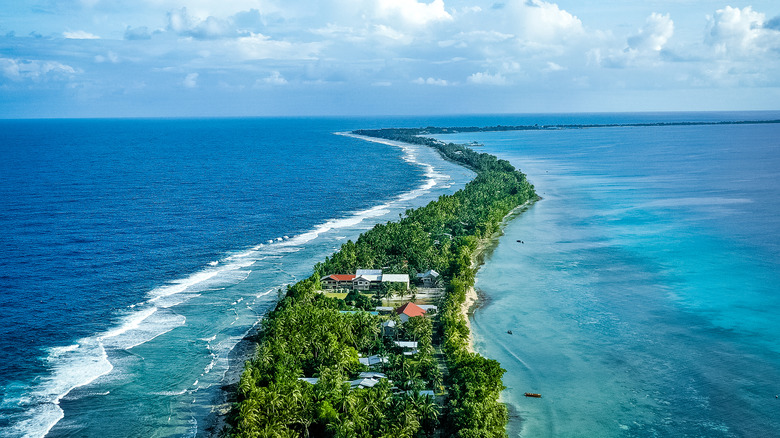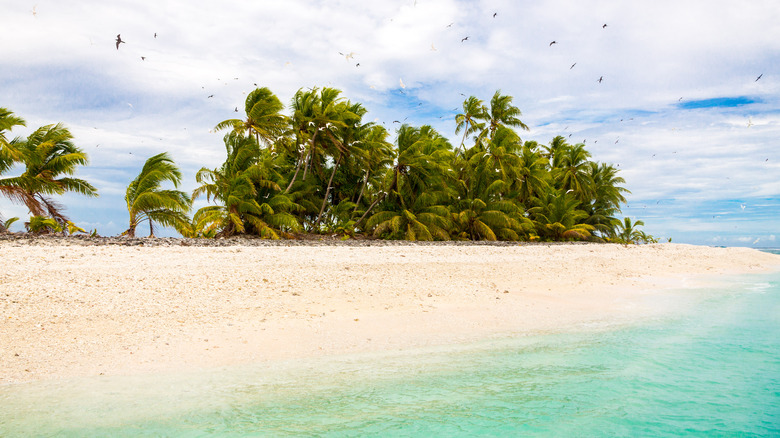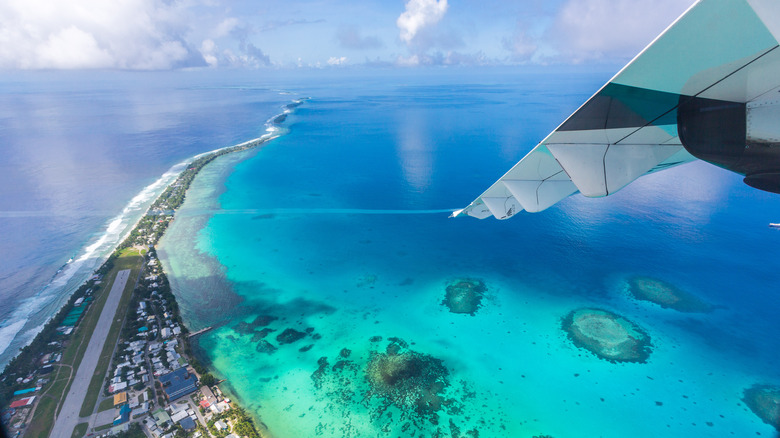Why The World's Least Visited Country May Become The First Digital Nation Ever
In the beautiful blue seas of the South Pacific awaits a remote island paradise where you can experience a vacation akin to a private island getaway. Tuvalu is one of the world's smallest and most underrated countries. It consists of nine coral reef islands located between Australia and Hawaii, about 732 miles north of Fiji. 12,000 people who call the 10 square mile country home may soon become citizens of the first-ever digital country.
Tuvalu is known for its natural beauty with its pristine beaches extending into the sparkling ocean. Tourists won't find a lot of amenities, but they will enjoy a beautiful, unspoiled island paradise and an incredible cultural experience without hordes of other tourists. On top of being a remote, peaceful, and beautiful destination, Tuvalu is the least visited country in the world, receiving under 4,000 visitors annually. It's an excellent place for snorkeling and scuba diving, particularly within the Funafuti Conservation Area. People of Tuvalu enjoy life in small traditional villages and speak a combination of their local language, Tuvaluan, and English. Culturally, the population is primarily Polynesian, and traditional dance and music are still widely enjoyed.
Unfortunately, Tuvalu may soon be lost to rising sea levels, as experts estimate that the nation will soon sink. In order to preserve their autonomy as a country and their cultural identity, Tuvalu may become the world's first digital nation. Using satellite technology and drone footage, they hope to create a digital copy of the island so displaced citizens can experience their homeland.
A sinking nation's fight to preserve sovereignty
Since it sits only 16 feet above sea level at its highest point, the threat of rising ocean levels is dire in Tuvalu. Over the past 30 years, sea levels have already risen six inches, and according to NASA climate data, will only continue to rise at an ever-increasing rate. In addition to eroding coastlines, extreme weather events are becoming more common. Based on current estimates, the country could become uninhabitable by the end of the century. Tuvalu is already looking ahead into futuristic ways to preserve its autonomy and cultural identity.
Prime Minister Kausea Natano has been at the forefront of the fight against the climate crisis, repeatedly delivering powerful messages and calling on the world to address climate change concerns immediately, but without drastic action, government officials are forced to plan for the worst. In a speech at the UN Climate Change Conference (COP27), Tuvalu's Prime Minister outlined a creative plan that could pave the way for other nations undergoing the same threat. He plans to transition the nation of Tuvalu into the Metaverse as a digital country. "Our digital nation will provide an online presence that can replace our physical presence and allow us to continue to function as a state," he explained in his statement. Using an extensive library of photography, drone footage, and satellite images, they plan to create a virtual reality of Tuvalu where displaced citizens can go to meet with one another online and continue to share their language and culture.
Traveling to Tuvalu
Before Tuvalu becomes a destination that is only accessible online, you can still experience the secluded island paradise in real life. Due to its remote location, getting there is quite an adventure. The main island of Funafuti, the nation's capital, has one international airport. You'll first have to fly to the neighboring island of Fiji, as its airports, Nadi and Suva, are the only airports that currently connect to Tuvalu. Several flights depart each week on Fiji Airways and you can expect to spend upwards of $800 on round-trip flights from Fiji to Tuvalu.
Once you arrive on the island, you'll have a few options for places to stay. There are several hotels and guesthouses in the capital, including the Funafuti Lagoon Hotel, which is close to the airport and has beautiful views of the lagoon. Filamona Lodge is another excellent family-run option close to town. To make reservations, you must contact the hotels directly. Camping is another option for travelers who want to relax in nature. You can obtain permission from a private landowner to camp on the beach.
The best time of year to visit Tuvalu is during the dry season, which runs from May until October. Outside of these months, expect rainy weather and occasionally intense storms. During the dry season, you'll have ample opportunities to soak up the sun, relax on the beach, and snorkel or scuba dive in Tuvalu's gorgeous reefs. Plan your trip before the stunning nation is lost to climate change.


